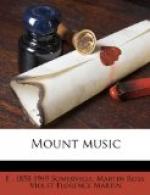He pitched himself headlong into the contest. The weather had fallen from grace. October, having been borne in on the wings of a gale, was storming on through wind and wet, and the game of canvassing, that had seemed, on that sunny day when he had written to Christian, so “frightfully interesting,” was beginning to pall. Boring as were the personal interviews, and exhausting the evening oratory in town halls and school-houses, the Sunday meetings at the gates of the chapels were still more arduous. On each Sunday, during the period between the death of Daniel Prendergast and the election of his successor, did young Mr. Coppinger, with chosen members of his “Commy-tee”—he had learnt to accept the inflexible local pronunciation—splash from chapel to chapel, to meet the congregations, and to shout platitudes to them. Larry began to feel that no conviction—however fervently held—could survive the ordeal of being slowly yelled to a bored crowd from the front seat of a motor car. He told himself that he had become a gramophone, and a tired gramophone, badly in want of winding up, at that.
It would be of little avail to attempt to define the precise shade of green of young Mr. Coppinger’s political flag; whether, as a facetious supporter put it, it was “say-green, pay-green, tay-green, or bottle.” It is enough to say that it varied sufficiently from that of Mr. Burke to provide their respective followers with a satisfactory casus belli. The shades of political opinion in Ireland change, and melt and merge into each other as the years pass, even as the colours of her surrounding seas vary, deepening and paling with the changing clouds, yet affecting only the surface, leaving the sullen depths unchanged. Larry knew no more of Ireland than a boy can learn in his school holidays; it was only by degrees that he realised that in Ireland, as he now found it, the single element of discord that remained ever unchanged was Religion. He had spent the four most recent and most receptive years of his life in an atmosphere in which religion had no existence. The hem of its raiment might, perhaps, have been touched, when, as sometimes happened, the subject of a studio composition was taken from the Bible, or the Apocrypha. Then, possibly, would the young pagans of Larry’s circle discover as much acquaintance with the Scriptures as would point a jest, and give an agreeable sensation of irreverence in discussing the details of the subject.




